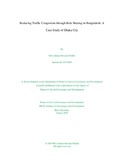Reducing traffic congestion through ride sharing in Bangladesh: a case study of Dhaka City

View/Open
Date
2020-02Publisher
Brac UniversityAuthor
Mollah, Md Lokman HossainMetadata
Show full item recordAbstract
Adequate transport infrastructure and services are prerequisite for sustainable economic and
social development. Ride Sharing Services is the innovation of private sector worldwide. It
has been introduced in Dhaka by the recent years. Ride Sharing Services Policy, 2017 has
been activated in March of 2018 in Bangladesh. The study aims to assess the contribution of
Ride Sharing Services (RSS) for reducing traffic congestion through lessening private
vehicles in Dhaka city and serving people by providing safe, comfortable and less costly
transport services or mass transportation. The main policies regarding transport sector are
National Integrated Multimodal Transport Policy, 2013; Revised Strategic transport Plan,
2015; Ride Sharing Policy, 2017; etc. Bangladesh Road Transport Authority (BRTA) is the
regulatory body of road transport sector in the country. Coordination and planning among
road transport stakeholders in the greater Dhaka area is done by the Dhaka Transport
Coordination Authority (DTCA). Both of them are working under the Road Transport and
Highway Division of the Ministry of Road Transport and Bridges. Bangladesh Road
Transport Authority (BRTA) is responsible for registration of the motor vehicles and issuing
licenses for drivers, approval of route permit, implementing the Motor Vehicles Ordinance
1983, after repeal of it; the Road Transport Act 2018 effected from 01 November 2019, Ride
Sharing Policy 2017, Taxicab Policy, CNG run three-wheeler auto-rickshaw Policy and other
related laws, rules, regulations, etc. Relevant literatures were reviewed in this regard but the
information about the number of reductions of private vehicles due to commencement of
Ride Sharing Services in Dhaka city could not be found. This is important to find the
necessary information regarding reducing traffic congestion and convenience of people due
to the operation of Ride Sharing Services in Dhaka city. In this case study, qualitative data
collection approach has been followed under inductive method. Information mainly collected
through Key Informant Interviews (KII), Focus Group Discussion (FGD) and secondary data
for trend analysis. Ride Sharing Services (RSS) companies have created the opportunity of
making the travelling services easier, safe, time saving and comfortable without creating
burden on the road by increasing more private cars in Dhaka. They have utilized the existing
facilities, vehicles population by connecting the vehicle owner and driver by using their
mobile apps. Users are being satisfied by the opportunity of safe, comfortable, time saving
and cost effective service provided by ride sharing service provider companies through their
mobile apps and existing vehicles of the Dhaka city. Traffic congestion may not be reduced
very shortly due to construction works of MRT, BRT, Elevated Expressway and other works
in Dhaka but it would not be further aggravated by this Ride Sharing Services.
